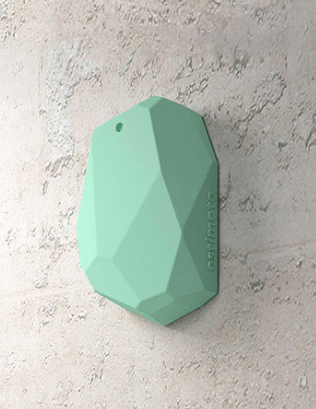Estimote’s first prototype looked like a parrot. They designed it to sit in stores and count the humans entering and leaving the location and could register their paths through the aisles and even added analytics based on sex and purchasing patterns. In all, if you were a store owner, that weird little parrot, eternally connected to the Internet, was a brand new way of doing business.
The parrot is gone but Estimote has just launched out of the latest Y Combinator class and is ready to create an OS for physical locations. Their product, the Beacon, now looks like a lumpen, colored gem and sticks to the wall, reporting on current retail traffic and pushing notifications to shoppers – who have pre-registered for the messages, of course. The promise of the platform is thrilling if you’re in sales and even more interesting if you’re a customer. In short, the environment interacts with you in a manner heretofore unavailable to individual retailers and it does it using your own smartphone.

Originally founded in Krakow, Poland by Jakub Krzych and Łukasz Kostka, the company ran under the radar in 2012 – the parrot was a preliminary prototype – and is now officially accepting pre-orders. The pair have MSc degrees in computer science and Krzych founded AdTaily, a self-service advertising network.
I spoke to Krzych about the project.
TC: Describe the Estimote in your own words.
Krych: Estimote is a technology startup that is engaged in building a sensor-based analytics and engagement platform. We developed what we like to call an operating system for physical locations—one that will change how people run businesses in the physical world and how consumers interact with real-world products and venues.
Our primary area of interest at this moment is brick and mortar retail stores. More than 90 percent of transactions worldwide are still made in physical venues. More importantly, more than half of consumers who visit stores have smartphones, and that number is growing rapidly.
Thanks to popular communication technologies such as Bluetooth and WiFi, there are exciting new opportunities to understand how people behave and engage with products in stores.
New data and communication technology can be used to improve customer experience, bringing in new revenue streams for retail stores or cutting their costs. We call this smart retail.
We are currently piloting our solutions with the largest retailers in the United States and Europe. We have also launched preorder sales of our Developer Kits, which consist of sample beacon devices, as well as our SDK, which enables mobile developers and retail consulting agencies to add micro-location context to their mobile apps.
TC: Why did you decide on this, of all things? The Internet of Things is pretty broad. Why shops and businesses?
JK: The Internet of Things is pretty broad, and yet it still lacks standards because of competing technologies like Zigbee, NFC, WiFi, and Bluetooth.
We believe there is a winner already, and it is called Bluetooth Low Energy. Major phone manufacturers like Apple, Google, and Nokia have supported it in their latest phones. It means that objects and venues will eventually be connected to the Internet, but through people’s smartphones.
More than a half of shoppers visiting retail stores have smartphones, and brick and mortar stores are still responsible for the vast majority of transactions worldwide. We expect this to continue, at least for a while. Trying, touching, and browsing in the real world is a much better shopping experience that even the best eCommerce can provide.
In order to compete with online shopping, however, physical retailers need to shift toward something we call bricks-and-clicks. This involves getting rid of all the dirty parts, like carts, queues, inventory, swiping cards, bags, etc., and just focusing on providing an outstanding in-store customer experience.
The rest will be performed seamlessly, by technology in the shoppers’ pockets and by sensors in the venue. As a retailer, you don’t have to keep inventory in order to make your customers happy and generate revenue. Amazon and other online retailers have already demonstrated the right way to handle shipping and logistics.
The future of retail is not wooden pencils and copying down obscure Swedish names in the furniture store. It’s also not about QR codes and PDF flyers on your phone. We knew there must be a better way, and we decided to find it.
TC: How many will you need to sell to make a strong network?
JK: The small beacons we produce broadcast venue-specific data to smartphones that are as far away as 160 feet (50 meters) and as close as 2 inches. They trigger different actions on consumer phones depending on their arrival time and distance from the product, and even precise behavior like trying on clothes or touching the product. The more beacons, the richer the experience, but even a few dozen will be enough to create great micro-location apps in the store. Different mobile apps could talk to the same beacons, and our strategy is to grow the network by delivering basic apps to retailers for their venues, like the in-store analytics or indoor navigation, as well as provide third parties a SDK to develop their own apps.
TC: How much traction do you have?
JK: We are currently piloting our solutions with the largest retailers in the United States and Europe. We are registering millions of beacon-smartphone interactions every day.
We have also launched preorder sales of our Developer Kits, which consist of sample beacon devices, as well as our SDK, which enables mobile developers and retail consulting agencies to add micro-location context to their mobile apps. There is huge interest in our product, and we plan to ship the first batch of beacons later this summer.
TC: How are you different from other players in retail tracking?
JK: There are other retail sensor companies that use, for example, WiFi scanners to register people’s in-store presence and behavior. But we don’t think tracking visitors’ smartphones without their permission is a good idea. We believe the superior approach is to incentivize users to download apps that will enrich their in-store experience by providing indoor navigation, on-demand customer service, and even contact-less payments. Consumers can opt-in if the app is solving their real problems, and most will accept some data collection if they know it will be used to improve their experience.
TC: Why did you decide to head out of Poland? Is the Bay Area better?
JK: Estimote is entirely designed, developed, and manufactured in Poland by our multidisciplinary team in Kraków. We benefit a lot from the strong tech culture of engineers there, and we are also able to incorporate into the project ideas that customers in Europe and especially Poland value the most, such as transparency and user privacy, which are all-important in the type of project we are developing. In addition to our European offices, we decided to start our operations also in the United States. The smartphone penetration among consumers is very high here, and we have found that retailers are quite eager to innovate.






























Comment